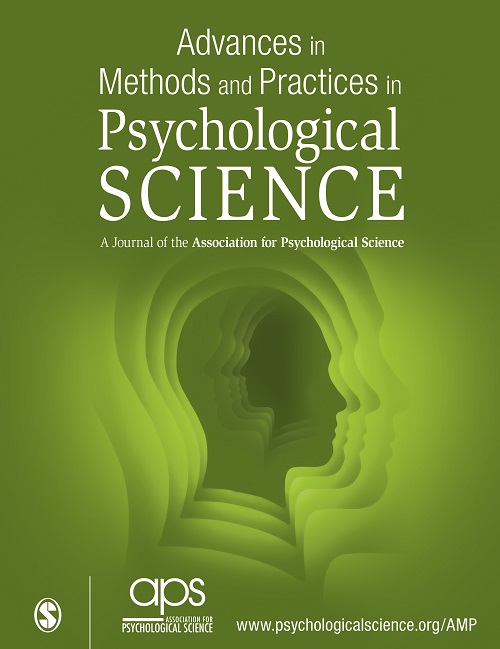外行人可以预测哪些社会科学研究将被成功复制
IF 13.4
1区 心理学
Q1 PSYCHOLOGY
Advances in Methods and Practices in Psychological Science
Pub Date : 2020-08-21
DOI:10.1177/2515245920919667
引用次数: 24
摘要
最近的大型合作项目表明,社会科学文献中的一些关键发现无法成功复制。在这里,我们评估一个发现的复制成功与它的直觉合理性有关的程度。27项备受瞩目的社会科学发现,每一项都由233名没有心理学博士学位的人进行评估。结果表明,这些外行人预测复制成功的准确度高于机会(即59%)。此外,当参与者被告知原始研究证据的强度时,他们的预测能力提高了67%。我们讨论了预测模式,并应用信号检测理论将检测能力从响应偏差中解脱出来。我们的研究表明,外行人的预测包含有用的信息,可用于评估某一既定发现被成功复制的可能性。本文章由计算机程序翻译,如有差异,请以英文原文为准。
Laypeople Can Predict Which Social-Science Studies Will Be Replicated Successfully
Large-scale collaborative projects recently demonstrated that several key findings from the social-science literature could not be replicated successfully. Here, we assess the extent to which a finding’s replication success relates to its intuitive plausibility. Each of 27 high-profile social-science findings was evaluated by 233 people without a Ph.D. in psychology. Results showed that these laypeople predicted replication success with above-chance accuracy (i.e., 59%). In addition, when participants were informed about the strength of evidence from the original studies, this boosted their prediction performance to 67%. We discuss the prediction patterns and apply signal detection theory to disentangle detection ability from response bias. Our study suggests that laypeople’s predictions contain useful information for assessing the probability that a given finding will be replicated successfully.
求助全文
通过发布文献求助,成功后即可免费获取论文全文。
去求助
来源期刊
CiteScore
21.20
自引率
0.70%
发文量
16
期刊介绍:
In 2021, Advances in Methods and Practices in Psychological Science will undergo a transition to become an open access journal. This journal focuses on publishing innovative developments in research methods, practices, and conduct within the field of psychological science. It embraces a wide range of areas and topics and encourages the integration of methodological and analytical questions.
The aim of AMPPS is to bring the latest methodological advances to researchers from various disciplines, even those who are not methodological experts. Therefore, the journal seeks submissions that are accessible to readers with different research interests and that represent the diverse research trends within the field of psychological science.
The types of content that AMPPS welcomes include articles that communicate advancements in methods, practices, and metascience, as well as empirical scientific best practices. Additionally, tutorials, commentaries, and simulation studies on new techniques and research tools are encouraged. The journal also aims to publish papers that bring advances from specialized subfields to a broader audience. Lastly, AMPPS accepts Registered Replication Reports, which focus on replicating important findings from previously published studies.
Overall, the transition of Advances in Methods and Practices in Psychological Science to an open access journal aims to increase accessibility and promote the dissemination of new developments in research methods and practices within the field of psychological science.

 求助内容:
求助内容: 应助结果提醒方式:
应助结果提醒方式:


